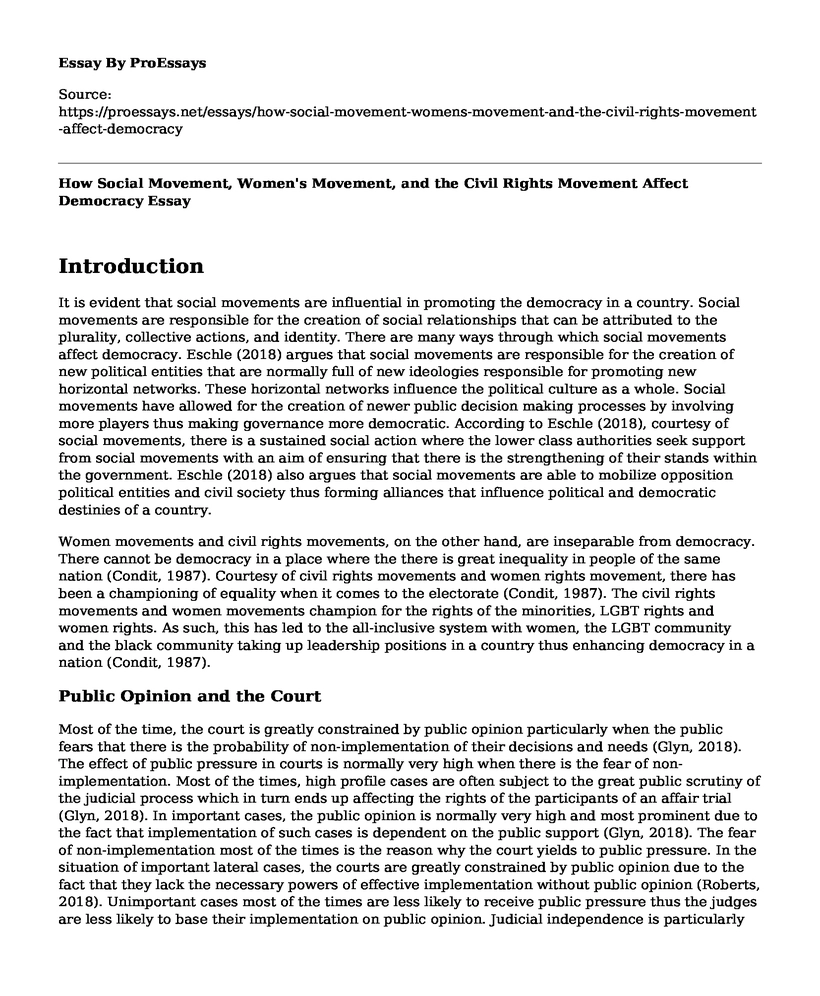Introduction
It is evident that social movements are influential in promoting the democracy in a country. Social movements are responsible for the creation of social relationships that can be attributed to the plurality, collective actions, and identity. There are many ways through which social movements affect democracy. Eschle (2018) argues that social movements are responsible for the creation of new political entities that are normally full of new ideologies responsible for promoting new horizontal networks. These horizontal networks influence the political culture as a whole. Social movements have allowed for the creation of newer public decision making processes by involving more players thus making governance more democratic. According to Eschle (2018), courtesy of social movements, there is a sustained social action where the lower class authorities seek support from social movements with an aim of ensuring that there is the strengthening of their stands within the government. Eschle (2018) also argues that social movements are able to mobilize opposition political entities and civil society thus forming alliances that influence political and democratic destinies of a country.
Women movements and civil rights movements, on the other hand, are inseparable from democracy. There cannot be democracy in a place where the there is great inequality in people of the same nation (Condit, 1987). Courtesy of civil rights movements and women rights movement, there has been a championing of equality when it comes to the electorate (Condit, 1987). The civil rights movements and women movements champion for the rights of the minorities, LGBT rights and women rights. As such, this has led to the all-inclusive system with women, the LGBT community and the black community taking up leadership positions in a country thus enhancing democracy in a nation (Condit, 1987).
Public Opinion and the Court
Most of the time, the court is greatly constrained by public opinion particularly when the public fears that there is the probability of non-implementation of their decisions and needs (Glyn, 2018). The effect of public pressure in courts is normally very high when there is the fear of non-implementation. Most of the times, high profile cases are often subject to the great public scrutiny of the judicial process which in turn ends up affecting the rights of the participants of an affair trial (Glyn, 2018). In important cases, the public opinion is normally very high and most prominent due to the fact that implementation of such cases is dependent on the public support (Glyn, 2018). The fear of non-implementation most of the times is the reason why the court yields to public pressure. In the situation of important lateral cases, the courts are greatly constrained by public opinion due to the fact that they lack the necessary powers of effective implementation without public opinion (Roberts, 2018). Unimportant cases most of the times are less likely to receive public pressure thus the judges are less likely to base their implementation on public opinion. Judicial independence is particularly constrained when judges attempt to alter particular policies (Roberts, 2018). The Supreme Court, in particular, is independent in deciding cases related to judicial administration, judicial liability and criminal prosecution. However, the same court finds it had when it tries to change policies that are above the control of lower courts and cases that attract public scrutiny. An example of the influence of public opinion is in the Kobe Bryant assault case, Duke lacrosse case and the Patient Protection and Affordable Care Act Cases (Roberts, 2018). In my opinion, public opinion should not influence the court as this often results in the lack of justice for the persons involved. For there to be justice, the courts should be completely independent of public opinion.
References
Condit, C. M. (1987). Democracy and civil rights: The universalizing influence of public argumentation. Communications Monographs, 54(1), 1-18.
Eschle, C. (2018). Global democracy, social movements, and feminism. Routledge.
Glynn, C. J. (2018). Public opinion. Routledge.
Roberts, J. (2018). Public opinion, crime, and criminal justice. Routledge.
Cite this page
How Social Movement, Women's Movement, and the Civil Rights Movement Affect Democracy. (2022, Jul 08). Retrieved from https://proessays.net/essays/how-social-movement-womens-movement-and-the-civil-rights-movement-affect-democracy
If you are the original author of this essay and no longer wish to have it published on the ProEssays website, please click below to request its removal:
- Assassination of Martin Luther King Jr Essay
- Essay Sample on Virtue Ethics and Aristotle's Doctrine of the Mean
- Shelter for Abused Women Essay Example
- Innovation: Making a Safer Environment and Reducing Crime Rates - Essay Sample
- Essay Sample on Prisons Face Healthcare Crisis: Prisoners Deserve Better
- Paper Example on Reviving Professional Culture in Education
- Essay Example on Overview of the Social Problem







